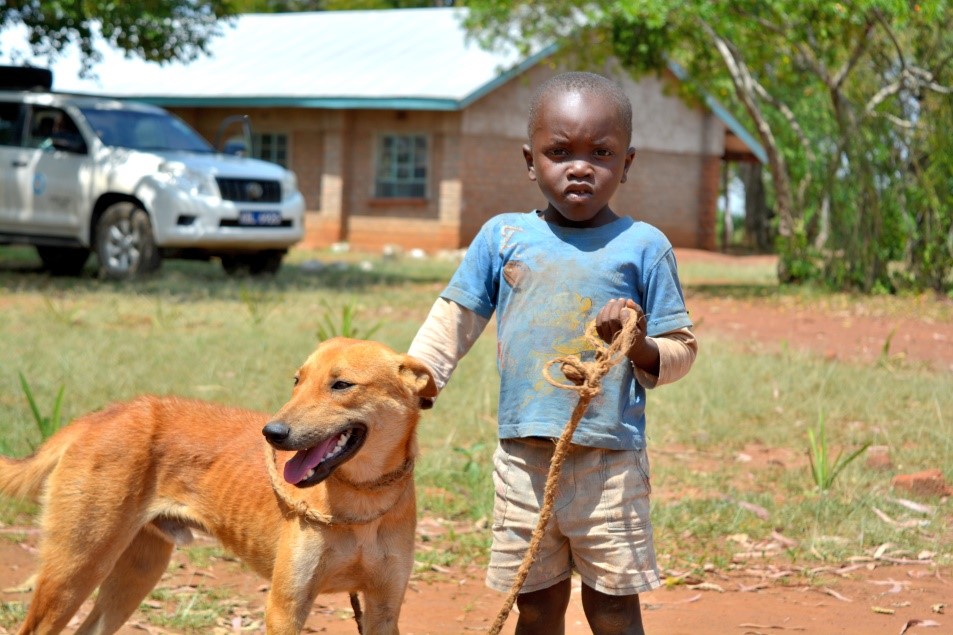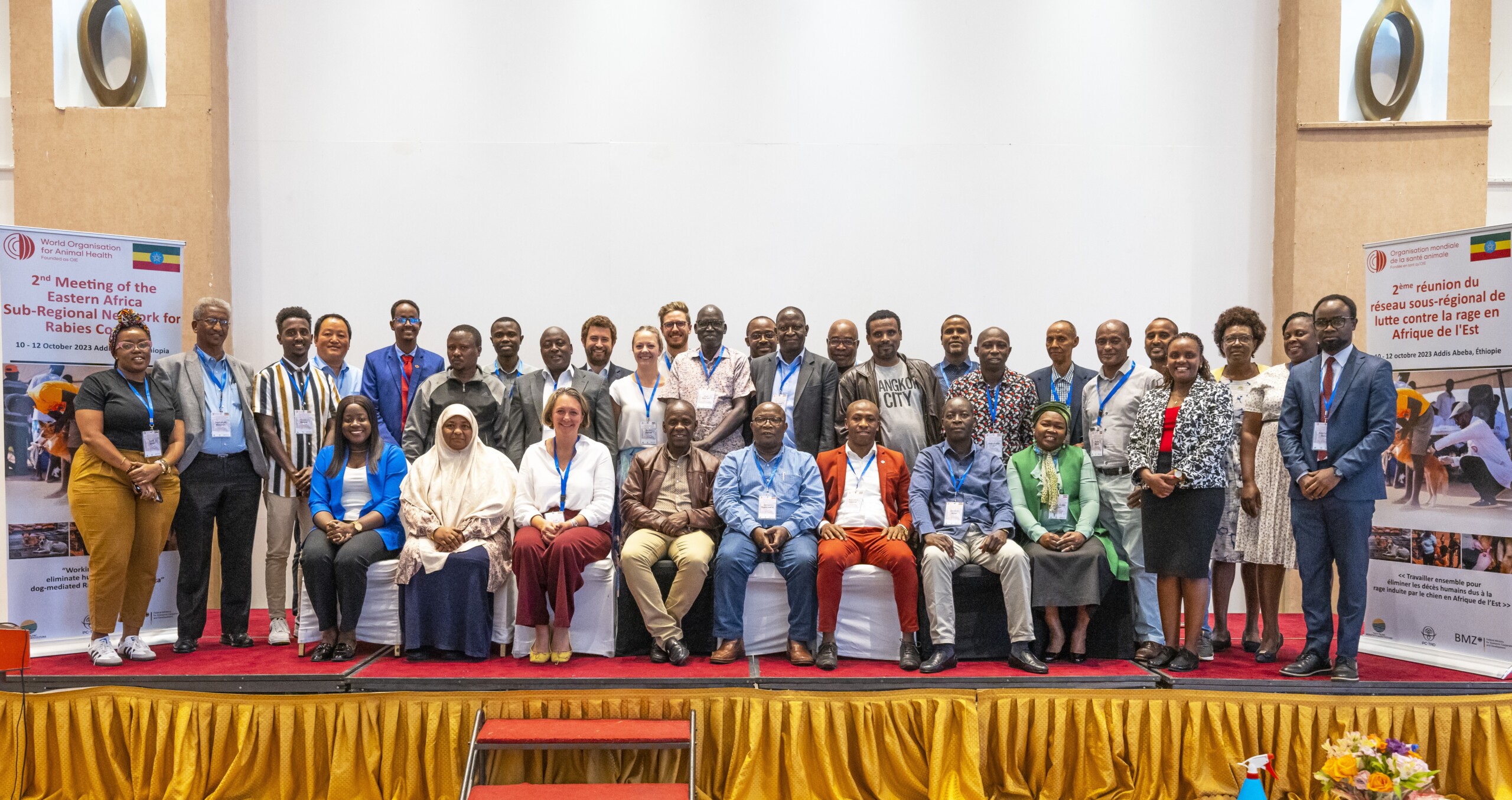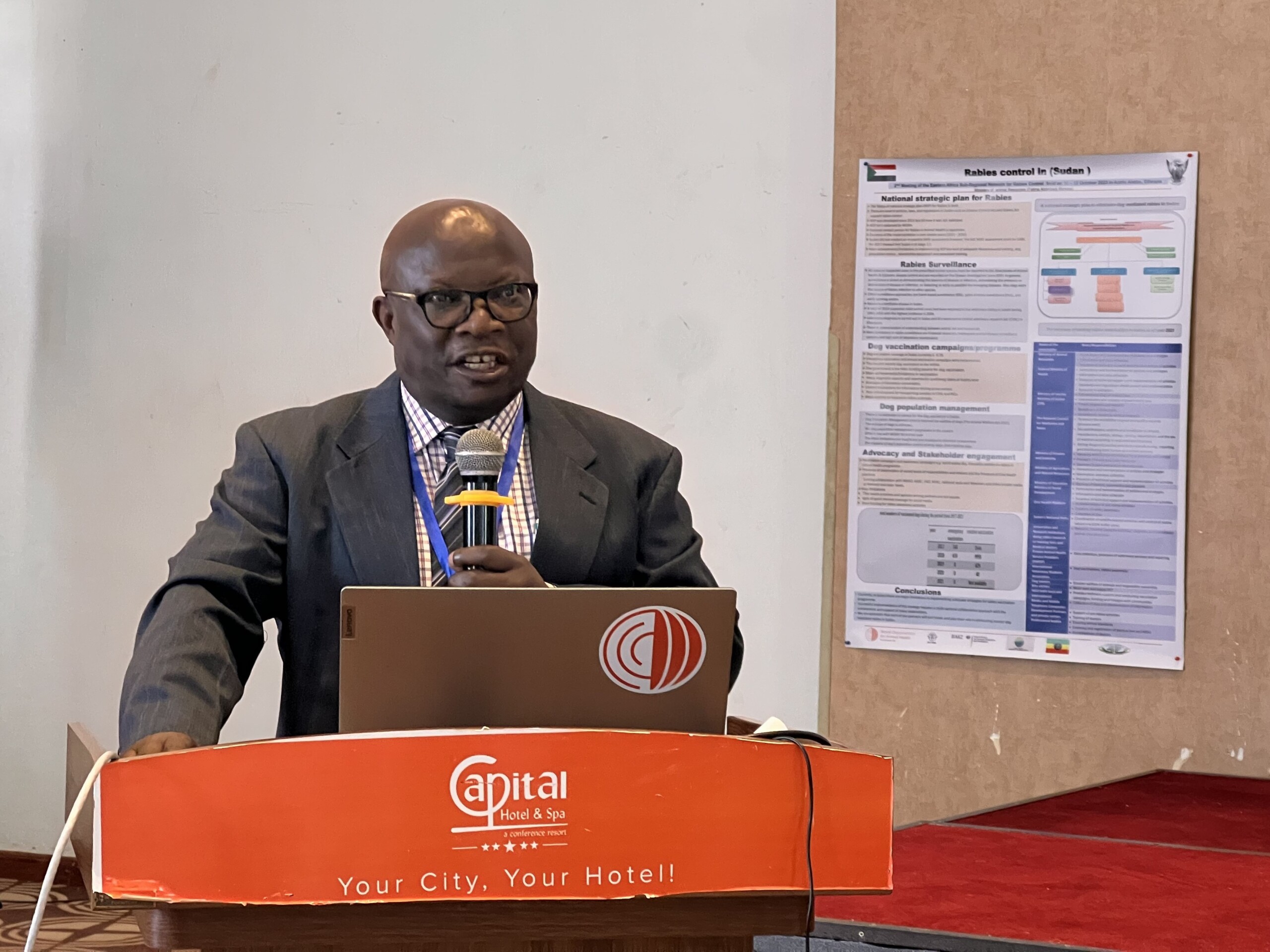
The 2nd Meeting of the Eastern Africa Sub-Regional Network for Rabies control brought together a diverse group of experts from the animal and human health sectors. Together, we discussed the pressing challenge of dog-mediated rabies and identified key findings and recommendations to achieve the global goal of eliminating human deaths from this disease by 2030. The importance of strengthening national strategic plans for rabies control and increasing investments and collaboration to secure sustainable financing for comprehensive rabies control programs was emphasized.
These plans should prioritize mass dog vaccination, surveillance, and data collection and reporting. The vital role of accurate and comprehensive data in effective rabies control was also highlighted. Countries were therefore encouraged to prioritize data collection, sharing, and reporting and to foster open data sharing among relevant sectors. The use of available resources and tools, such as the “United Against Rabies” toolbox, should be integrated into national programs to enhance data quality. Harmonization of data collection and reporting practices within countries and across regions will allow for a more coordinated and efficient response to rabies outbreaks and monitoring of progress toward the 2030 global target.
Building capacity for rabies surveillance was discussed as a crucial element, especially in countries with gaps in their surveillance systems. This includes establishing rabies laboratory infrastructure and testing capacity, conducting training for rabies diagnosis, and strengthening the overall lab system. Countries with limited capacity for data sharing should seek support and training to enhance their data-sharing capabilities. Collaborative efforts with ministries and relevant organizations are crucial to ensure official reporting of data. Access to testing materials was also highlighted as being vital for timely and accurate diagnosis. We strongly urge governments, organizations, and individuals to join us in this effort. Together, we can make a difference and eliminate dog-mediated rabies by 2030. The Members are committed to working towards a future where human deaths from rabies are a thing of the past.
Dr Samuel Wakhusama, giving his remarks during the official opening of the meeting. Picture (c) L. Iyadi (woah) 2023.
The Global Strategy to eliminate human deaths from dog-mediated Rabies by the year 2030 remains a top priority worldwide. This initiative offers a unique opportunity to operationalise the One Health concept at global, regional, and national levels, thereby strengthening health systems, particularly in low-income countries. Rabies is a key neglected endemic zoonosis targeted for implementation under the Quadripartite’s (FAO, WHO, UNEP, and WOAH) One Health Joint Plan of Action (OH JPA).
In line with the Global Strategic Plan to end human deaths from dog-mediated rabies by 2030 (Zero by 30) and the recommendations of the Regional Coordination Group of the Quadripartite partners in Africa, many countries are working to develop and implement national strategic plans for the control and elimination of rabies, with significant support from UAR partners.
The workshop aimed to achieve the following objectives:
| Workshop Agenda | ||
| Day 1: Tuesday 10 October 2023 | ||
| Time | Title | Speaker |
| 8.00 – 9.00 | Registration | Ms Grace Omwega, Ms Lyne Iyadi |
| Session 1: Introduction and workshop objectives | ||
| 9:00 – 9:30 | Participant introductions and Workshop expectations | Dr Lillian Wambua (WOAH) |
| 9.30 – 10.00 | Speeches: Opening remarks | Representatives: Government of Ethiopia, GARC, Africa CDC, ILRI, FAO, WHO, WOAH |
| 10.00-10.15 | Presentation: Introduction and aims of the meeting | Dr Samuel Wakhusama (WOAH) |
| 10:15 – 10:30 | Presentation: Lessons learnt from global Rabies networks | Andre Coetzer (GARC) |
| Session 2: Developing and progressing national control programmes for dog-mediated rabies) | ||
| Session chair : Claude Sabeta (WOAH Expert) Rapporteurs: Lillian Wambua, Serge Mpouam (WOAH) | ||
| 10:30 – 10:45 | United Against Rabies Forum Roadmap and SARE | Dr Andre Coetzer (GARC) |
| 10:45 – 11:00 | Experience of conducting SARE workshop in Ethiopia | Veterinary Services (Ethiopia) |
| 11.00-11.30 | Coffee break, photo session, interviews | Lyne Iyadi (WOAH) |
| 11.30-11.45 | Presentation: Overview of National Strategic Plan and international milestones | Dr Rachel Tidman (WOAH) |
| 11:45 – 12:30 | Country presentations: Rabies national strategic plans:
(3 mins presentation per country) |
Delegates/Rabies Contact persons (Burundi, Comoros, Djibouti, Eritrea, Ethiopia, Kenya, Rwanda, Somalia, South Sudan, Sudan, Tanzania, Uganda) |
| 12:30 – 12:40 | Question of the day: Mobilizing sustainable financing for Rabies NSPs | Dr Serge Mpouam (WOAH) |
| 12: 40 – 13:45: | Lunch Break and interviews | Lyne Iyadi (WOAH) |
| 13:45 – 14:45 | Group work with case study (FR and EN): Development, implementation and endorsement of national strategic plans | Dr Rachel Tidman (WOAH) |
| 14:45 – 15:45 | World Café Interactive poster session: National Strategic plans for Rabies | Session Chair |
| 15:45 – 16:00 | Coffee break | |
| 16.00 – 17.00 | Plenary: Role of the East Africa Rabies network in implementation of National Strategic plans? | Drs Lillian Wambua and Serge Mpouam (WOAH) |
| Day 2: Wednesday 11 October 2023 | ||
| Time | Title | Facilitators/Speaker |
| Session 3: Improving rabies data collection and reporting | ||
| Session chair(s): Drs Andre Coetzer and Frédéric Lohr Rapporteurs: Desmond Rono, Serge Mpouam (WOAH) | ||
| 8.30 – 8.45 | Recap of Day 1 | National participants (FR) |
| 8:45 – 8:55 | Question of the day: Increasing efficiency of Rabies surveillance and data-sharing | Dr Tenzin Tenzin (WOAH) |
| 8:55 – 9.15 | Presentation: United Against Rabies Minimum Data Elements | Dr Frédéric Lohr (Mission Rabies, UK) |
| 9:15 – 9:30 | Presentation: WHO Rabies Surveillance | WHO |
| 9:30 – 9.45 | Presentation: Surveillance & Reporting of Rabies data | Dr Rachel Tidman (WOAH) |
| 9.45 – 10.00 | Presentation: Event-based surveillance framework: Application to Rabies surveillance | Dr Maryam Buba (Africa CDC) |
| 10:00 – 10:30 | Plenary: Q & A session | Dr Andre Coetzer (GARC) |
| 10.30 – 11.00 | Coffee break and Interviews | Lyne Iyadi (WOAH) |
| 11:00 – 11.15 | Presentation: Country experience of Namibia in Rabies Surveillance | Dr Tenzin Tenzin (WOAH) |
| 11:15 – 11:30 | Presentation: Country experience of Tanzania in Rabies Surveillance | Dr Samwel Mngumi (Tanzania) |
| 11.30-12.30 | Moderated discussion: Strengths/weaknesses/opportunities/threats of One Health approach in Rabies data collection, sharing and reporting | Drs Lillian Wambua & Serge Mpouam (WOAH) |
| 12.30 – 13.30 |
Lunch
|
|
| 13:30 – 15:00 | Group work with case study (FR and EN): Using paper-based and electronic data capture mechanisms to support dog vaccination campaigns | Dr Andre Coetzer (GARC), Dr Frédéric Lohr (Mission Rabies) |
| 15.00 – 15.30 | Coffee break
|
|
| 15.30 – 16.30 | Plenary discussion: How can this network support countries in improving data collection, sharing and reporting? | Desmond Rono and Dr Serge Mpouam (WOAH) |
| 18:00 – 20:00 | Social event/dinner
|
|
| Day 3: Thursday 12 October 2023 | ||
| Time | Title | Facilitators/Speaker |
| Session 4: Support from Laboratory Networks in progressing rabies control programmes | ||
| Session Chairs: Prof Claude Sabeta and Dr Samuel Wakhusama Rapporteurs: Dr Tenzin Tenzin, Desmond Rono | ||
| 8.30-8.45 | Recap Day 2 | National participants (EN) |
| 8:45 – 8:55 | Question of the Day: What are the key gaps and opportunities for Rabies research in national and regional level? | Serge Mpouam (WOAH) |
| 8:55 – 9.15 | Presentation: Overview of RABLAB and available support for countries | Prof Claude Sabeta (WOAH expert) |
| 9.15 – 9.30 | Presentation: Laboratory proficiency testing for Rabies diagnosis | Mr Chenjerai Njagu (FAO -ECTAD Ethiopia) |
| 9.30-9.45 | Presentation: Country experience from Eritrea on improving laboratory training/capacity | Dr Yonas Woldu (Eritrea) |
| 9.45-10.45 | Moderated discussion: Strengths/weaknesses/opportunities/threats of Rabies laboratory diagnostic capacity | Prof Claude Sabeta (WOAH expert) |
| 10.45 – 11.15 | Coffee
|
|
| Session 5: Sub-regional coordination and operationalizing the East Africa rabies network | ||
| Session Chairs: Prof Claude Sabeta and Dr Samuel Wakhusama Rapporteurs: Dr Tenzin Tenzin, Desmond Rono | ||
| 11.00 – 11.15 | Presentation: One Health Research Centre Africa (OHRECA) and NTDs research | Dr Lian Thomas (ILRI) |
| 11.15 – 11.30 | Presentation: Economic considerations of the One Health approach in national Rabies programmes | Dr Maurice Karani (ILRI)
|
| 11:30 – 11:45 | Presentation: Tracking the Rabies virus in Africa: Trends from genomics surveillance
|
Dr Claude Sabeta (WOAH expert)
|
| 11:45 – 12:00 | A century of Rabies in Kenya
|
Dr Matthew Muturi (Kenya)
|
| 12.00 – 13:00 | Moderated discussion: Harnessing research and community engagement and integrating Rabies control into national disease control programmes | Dr Serge Mpouam (WOAH) |
| 12.30 – 13.30 | Lunch
|
|
| 13.30 – 15:00 | Group Work (FR and EN):
|
Dr Lillian Wambua and Desmond Rono (WOAH) |
|
||
|
||
|
||
| Plenary: What are clear action items for this network over the next 12 months? | ||
| 15.00 – 15:15 | Closing of meeting | Dr Samuel Wakhusama (WOAH) |


